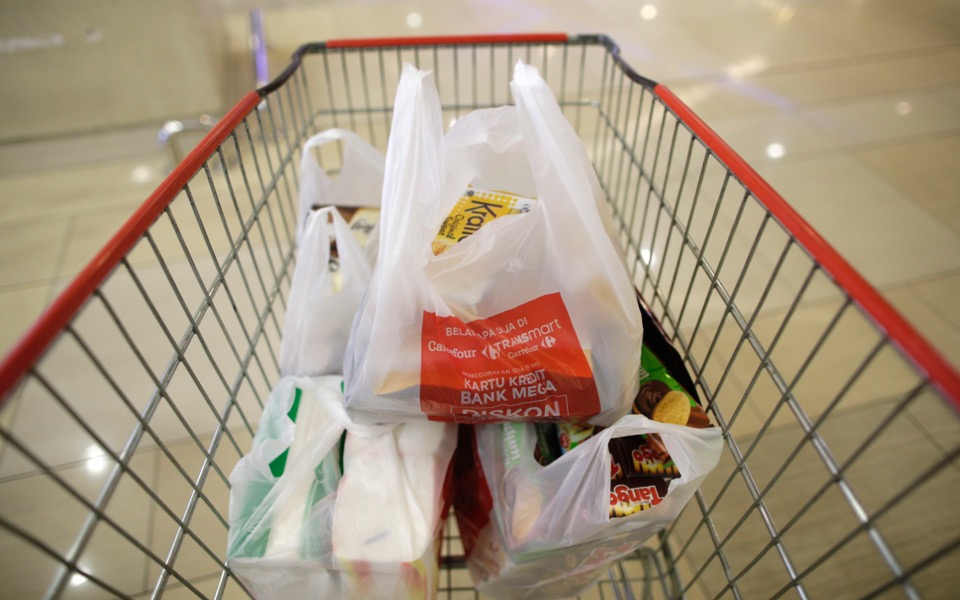Decade-long war on plastic bags fails to yield results

“No more plastic bags,” newspaper titles touted on August 10, after the publication of a joint ministerial decree announcing that consumers would have to pay 3 cents for each plastic shopping bag used as of January 1, 2018, and 7 cents as of January 1, 2019.
The decision was aimed at bringing Greece in line with a European Commission directive from 2015, which set a target of reducing dependence on plastic carrier bags by 50 percent through 2017 and 80 percent by 2019. Environmental groups hailed the initiative, which, after all, had been in the pipeline for nearly a decade.
It was January 2008 when Greek newspapers reported that “plastic bags in Athens will soon be a thing of the past.” The crusade had been declared by then mayor of Athens Nikitas Kaklamanis, who went on to sign a memorandum of cooperation with most of the country’s big supermarket chains so that they would provide carrier bags that were more eco-friendly.
The initiative was short-lived. On the one hand, Greek supermarkets insisted that the state impose a fee on plastic bags, otherwise they were at risk of losing business, while on the other, the measure was opposed by consumer groups.
Filippos Kyrkitsos, the president of the Ecological Recycling Society, has attended all the discussions on the issue since it first emerged and remembers: “In 2008, environmental organizations and the association of supermarkets [then SESME] submitted a proposal calling for the introduction of a price of around 15 cents for a plastic bag at the supermarket checkout to be accompanied by a reduction of 0.3 percent on the price of all products at the store. At the same time, supermarkets would sell frequent-use bags to shoppers at a discounted price, in order to put Greece on the path to becoming a plastic bag-free country,” he says.
“The proposal was immediately opposed by the Consumer Institute (INKA) with the rather limp argument that consumers could not be expected to pay for their plastic carrier bags. The very next day, then environment minister Giorgos Souflias rejected the proposal and any discussion on the issue,” adds Kyrkitsos.
The only supermarkets that charge for plastic bags today are a couple of international chains because it is the policy of the parent company.
In the period that followed, not only did plastic bags fail to disappear from Athens (although many supermarket chains did), but their use across Greece shot up way above the European Union average.
Almost 10 years later, Greeks use more than 4.5 billion plastic bags a year in the retail market, or approximately 400 bags per person, when the European average is 175 bags per person per year. At the same time, the number of reusable bags (made of cloth, for example) is minimal at 0.5 per resident, when in Denmark the average is 75 and in the EU 23. Biodegradable plastic bags, meanwhile, represent less than 0.1 percent of the total.
Failure to tackle the issue has brought a lot of problems in its wake. “One in every three items of trash found at the bottom of the sea today is a plastic bag,” says Professor Giorgos Papatheodorou, who heads Patra University’s Laboratory of Marine Geology and Physical Oceanography. He also coordinated the Life Debag project for restricting the use of plastic carrier bags.
“It is worth noting that turtles, which feed on jellyfish, swallow large quantities of plastic bags that they mistake for food. Furthermore, numerous cases have been reported in Greek seas of dead marine animals whose stomachs were found to be full of plastic bags,” he adds. “It is estimated that 5 trillion microplastic particles weighing a total of 269,000 tons are polluting the Earth’s oceans, but we do not have any estimates in regard to Greek seas so far.”
According to experts, the use of plastic bags is expected to drop by 30 to 50 percent in 2018 compared to this year.





